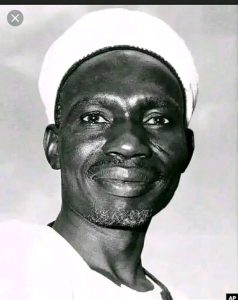Governance and Development Challenges In Nigeria
By Tobore Jerome

In spite of the effort by successive Nigerian government, poverty remains a major problem in the country.
This ugly situation is surprising because Nigeria is blessed with abundant human and natural resources that are capable of transforming the nation.
GOVERNANCE AND GOOD GOVERNANCE
The concept governance means different thing to different people. For instance the Webster’s Third New International Dictionary (1986:982) equating governance to government states that governance is “the act or process of governing, specifically authoritative direction and control”. The British Council states that “Governance involves interaction between the formal and those in civil society”. Governance refers to a process whereby elements in society wield power, authority and influence and enact policies and decisions concerning public life and social upliftment. This actually shows that governance does not only encompasses but transcends the collective meaning of related concepts like the state, government, regime and good government.
Governance involves creative intervention by political actors to change structures that inhibit the expression of human potential. Governance concerns big questions of a “constitutional” nature that establish the rules of political conduct. Governance is a rational concept, emphasizing the nature of interactions between state and social actors, and among social actors themselves. Also, Governance refers to particular types of relationships among political actors, that is those which are socially sanctioned rather than arbitrary.
The (United Nations Escap, 2010) asserted that governance is “the process of decision making and the process by which decisions are implemented or not implemented. It further argues that, governance can be used in several contexts such as corporate governance, international governance, national governance and local governance. Since governance is the process of decision making and the process by which decisions are implemented, an analysis of governance focuses on the formal and informal actors involved in decision making and implementing the decisions made and the formal and informal structures that have been set in place to arrive at and implement the decision. Government is one of the actors involved in governance vary depending on the level of government that is under discussion. In rural areas for instance, other actors may include influential land lords , associations of peasant farmers, cooperatives, NGO’s , research institutes, religious leaders, finance institutions, political parties, the military among others. The situation in urban areas is much more complex . Figure 1 provides the interconnections between actors involved in urban governance. At the national level, in addition to the above actors , media lobbyists, international donors, multi-national corporations, may play a role in decision making or in influencing the decision making process. All actors other than government and the military are grouped together as part of the civil society. In some countries in addition to the civil society, organized crime syndicates also influence decision making, particularly in urban areas and at the national level.
Nathaniel Umukoro (Development Administration: An African Perspective)
Meanwhile, Good governance is epitomized by predictable, open and enlightened policy making, a bureaucracy imbued with professional ethos acting in furtherance of the public good, the rule of law, transparent processes and a strong civil society participating in public affairs. Good governance has been said at various times to encompass full respect of human rights, the rule of law , effective participation, multi-actor partnership, political pluralism, transparent and accountable processes and institutions, an efficient and effective public sector, legitimacy, access to knowledge, information and education, political empowerment of people, equity, sustainability, and attitudes and values that foster responsibility, solidarity and tolerance.
The office of the UN High Commissioner for Human Rights (2006) identified key attributes of good governance required for development.
Participation by both men and women is a key cornerstone of good governance. Participation could be either direct or through legitimate intermediate institutions or representatives. It is important to point out that representative democracy does not necessarily mean that the concerns of the most vulnerable in society would be taken into consideration in decision making. Participation needs to be informed and organized, this means freedom of association and expression on the one hand and an organized civil society on the other hand .
Also, Rule of law is an integral component for good governance, for it requires fair legal framework that are enforced impartially. It also requires full protection of human rights, particularly those of minorities. Impartial enforcement of laws requires an independent judiciary and an impartial and incorruptible police force.
furthermore, transparency is also key to good governance, as it means that decisions taken and their enforcement are done in a manner that follows rules and regulations. It also means that information is freely available and directly accessible to those who will be affected by such decisions and their enforcement. Transparency also refers enough information provided and that it is provided in easily understandable forms and media.
Responsiveness, equity and inclusiveness, consensus oriented, effectiveness and efficiency, accountability are all hallmarks of good governance.
However, good governance and development in Nigeria has been marred by several factors.
The United States Agency for International Development in 2010 classified the problems associated with governance and development in Nigeria as Lack of Consensus, Rule of law, competition, inclusion and corruption.
Persistent ethnic and religious grievances susceptible to elite manipulation, rising political violence, electoral violence and thuggery, elite and class nature of politics (thereby excluding poor Nigerians from substantive involvement), authoritarian political elite, lack of adequate human rights protection, diversion and looting of public funds.
On the issue of rule of law, for instance, A federal capital territory High court on Monday slam a N100m fine against the federal government for prolonged detainment and violation of the fundamental human rights of the former governor of the Central Bank of Nigeria, Godwin Emiefele.
Delivering the judgment on Monday, the presiding judge, Olukayode Adeniyi, also restrained the FG and its agents from re-arresting or detaining Emefiele without an order of court.
He said, “It is hereby declared that the actions of the first and fourth respondents and its agents incarcerating the applicants from June 13, 2023, to October 26, 2023, when he was transferred to the custody of the fourth respondent and his further detention by the third and fourth respondents without arraignment in the court of law for the commission of any offence up until November 8, 2023, when by the order of this court when the applicant was released on bail to his senior learned counsel constitutes a flagrant violation of the applicant’s fundamental rights to personal liberty preserved by the provision of section 35 of the constitution of the Federal Republic of Nigeria 1979 and Article 6 of the African charter on human and peoples right.
“Also, a sum of 100m only is herby awarded in favour of the applicant against the first and fourth respondents jointly as damages for the unlawful violation of his fundamental right to his personal liberty.
“Without prejudice to the powers of the court with respect to the criminal trial, the applicant is currently facing at the High Court of the FCT, the respondents are hereby restrained either by themselves, their officers, agents, or any person acting on their behalf from further re-arresting or detaining the applicants without an order of a court of competent jurisdiction.”
During his ruling, Adeniyi said he found the remand warrant obtained by the third and fourth respondents were questionable.
“The third and fourth respondents referred to remand warrants obtained from the chief magistrate of the FCT in Wuse. I examined the said orders from the two magistrate courts and my finding is that the credibility is questionable,” he said.
He noted that the practice of arresting suspects before investigation by security agencies must stop.
Adeniyi said, “Time has come to put an end to the unwholesome culture and practices of arresting and keeping a suspect in detention before the investigation of the suspect alleged of an offence. A suspect must be allowed to have his day in court if indeed there is evidence of a commission of the crime against him”.
He also noted that the framers of the Constitution did not place a restriction on the High Court a citizens could seek redress for the violation of their fundamental human rights.
Corruption is another major factor that has been a bane to good governance and development in Nigeria.
Corruption is not particular to any gender, ethnic or religion, as several high personalities across gender, ethnic and religion raging from former governors, former ministers and current minister, former and serving lawmakers, public officials among others.
In recent weeks for instance, the suspended National Social Investment Programme Agency (NSIPA) coordinator, Halima Shehu was pick up by the Economic and Financial Crime Commission for diverting the sum of N44b to some private account just few days before the end of December 2023. The EFCC confirmed that about N17b have so far been recovered.
Also, the former minister for Humanitarian Affairs and Disaster Management, Sadiya Umar Farouk, was also invited by the EFCC and she is been investigated for an alleged missing of N37b from her ministry during her tenure as minister. She is being accused of aiding a contractor, James Okwete, to launder the sum.
Similarly, Betta Edu the current Minister for Humanitarian Affairs and Poverty Alleviation was suspended by President Bola Tinubu over the transfer of N585m from her ministry to a private account. In a leaked memo, she instructed the Accountant-General of the Federation, Dr Oluwatoyin Madein, to pay N585m into the private bank account of a project accountant in her ministry, Bridget Oniyelu.
The minister had claimed that the N585m payment was meant for vulnerable groups in Akwa Ibom, Cross River, Ogun, and Lagos states, describing the allegations against her as baseless.
The Media Assistant to the Minister, Rasheed Olarenwaju, said in a statement that it was legal within the civil service for such payments to be made into private accounts of staff members, especially project accountants.
Therefore, for Nigeria to have good governance and development, There have to be free, fair and credible elections.
Also, Government officials and elected representatives should remain responsive to the needs and aspirations of the people. The government should respect the fundamental human rights of the citizens.
Furthermore, Critical agencies such as anti-corruption institutions like the EFCC and ICPC should be allowed to operate without operate without political interference. The economy should be diversified in order to reduce dependence on mono oil resources. The citizens must be allowed to have substantive involvement in political activities. There should be empowerment of women and youths so as to reduce exclusion and hopelessness.


